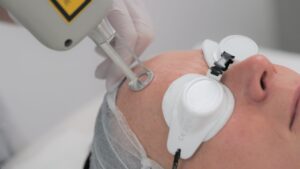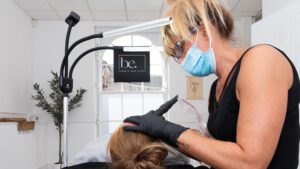Going through menopause can feel a bit like a rollercoaster, right? All those hormonal changes can throw some unexpected curveballs our way, and one of them is often unwanted hair popping up where it didn’t before. It’s a common thing, but it can be a bit of a nuisance. So, how do we deal with this new hair growth? Well, laser hair removal might just be the answer. If we get how our hormones are shifting and use smart laser treatments, we can really get a handle on this, which can make us feel much better about ourselves. Let’s look at how laser hair removal can be a good choice for managing hair that grows because of hormones.
Key Takeaways
- Menopause brings hormone shifts, like lower oestrogen, which can cause new hair growth in places you don’t want it.
- Laser hair removal works by hitting the hair follicles, but hormonal changes can make some hair grow back, so you might need more sessions.
- It’s really important to have regular top-up laser sessions to keep on top of any new hair that pops up because of hormones.
- Getting advice from a professional is super helpful; they can make a plan just for you, which is great for dealing with hormonal hair.
- Having realistic ideas about what laser treatment can do during menopause means you’ll be happier with the results and ready for ongoing care.
.
Understanding Menopause and Hormonal Changes in Hair Growth

Menopause is a big change in a woman’s life, mainly because of hormone shifts, especially with oestrogen and androgens. These changes can really mess with how hair grows. Oestrogen levels drop during menopause, while androgens, like testosterone, stay about the same or even go up. This can cause some pretty noticeable changes in where hair grows and how thick it is.
The Impact of Oestrogen and Androgen Levels
Oestrogen and androgens are key players in hair growth. Androgens are responsible for making hair thicker and encouraging growth in places like the face and body. Oestrogen, on the other hand, usually helps hair grow on the scalp and can make body hair less obvious. When oestrogen levels drop, the effects of androgens become more noticeable. Understanding how these hormones balance out and shift is super helpful for figuring out the changes that happen during menopause. It also helps in finding good ways to deal with hair growth that’s driven by hormones. If you are struggling with this, Be Laser & Skin Clinic Taunton can help.
Unwanted Hair Growth and Scalp Thinning
Because of these hormonal changes, you might see more hair growing where you don’t want it, like on your face, and your scalp hair might get thinner. The drop in oestrogen lets androgens have a bigger impact, often leading to coarser hair popping up in new spots. It’s common for women to notice more facial hair, especially on the chin and upper lip, while their scalp hair loses thickness and fullness. It can be annoying, but it’s a normal part of menopause.
The Science Behind Hormonal Shifts
Laser hair removal works by targeting melanin in hair follicles, disrupting hair growth. During menopause, hormonal fluctuations can lead to unwanted facial hair and thinning scalp hair. The decrease in oestrogen levels and an increase in androgens can cause these changes. Understanding the science behind these hormonal shifts and using targeted laser treatments can help women effectively manage this issue, boosting their confidence and appearance.
During menopause, hormonal fluctuations often result in unwanted facial hair and thinning scalp hair. The decrease in oestrogen levels and an increase in androgens can cause these changes. Understanding the science behind these hormonal shifts and using targeted laser treatments can help women effectively manage this issue, boosting their confidence and appearance.
Here’s a quick look at how hormones change during menopause:
- Oestrogen levels decrease.
- Androgen levels remain stable or increase.
- Hair growth patterns shift.
.
How Menopause Affects Laser Hair Removal Efficacy
Laser hair removal is pretty effective because it targets the melanin in hair follicles, zapping them with concentrated light. But menopause throws a bit of a wrench in the works thanks to those pesky hormonal changes. It’s not a total disaster, but it does mean you might need to adjust your expectations and treatment plan.
Targeting Melanin in Hair Follicles
Laser hair removal works by going after the melanin – that’s the pigment – in your hair follicles. The laser zaps the melanin, which damages the follicle and stops it from growing new hair. It’s usually a pretty straightforward process, especially if you’ve got dark hair and fair skin. The contrast makes it easier for the laser to find its target. This is why it’s a popular choice for long-term hair reduction.
Challenges from Hormonal Fluctuations
Menopause brings a whole host of hormonal changes, and these can make laser hair removal a bit trickier. As oestrogen levels drop, androgens (like testosterone) can become more dominant. This can lead to hair regrowth, even after you’ve had laser treatments. It’s not that the laser isn’t working; it’s just that your hormones are trying to mess things up. You might find you need more sessions than someone with stable hormone levels. It’s all about managing those expectations and understanding that hormonal regrowth is a possibility.
Reactivated Dormant Hair Follicles
One of the main issues is that hormonal changes can reactivate dormant hair follicles. These are follicles that were just chilling out, not doing anything, but suddenly they’re back in business thanks to the hormonal shifts. This means you might see new hair growth in areas you thought you’d already sorted out with laser. Regular maintenance sessions are key to keeping these reactivated follicles under control. Think of it like weeding a garden – you need to keep on top of it to prevent things from getting out of hand.
It’s important to remember that everyone’s experience with menopause and laser hair removal is different. What works for one person might not work for another. That’s why it’s so important to have a good chat with a professional who can assess your individual situation and tailor a treatment plan to suit your needs.
Recommended Laser Hair Removal Practises for Menopausal Women
Setting Realistic Expectations
Okay, so let’s be real. Laser hair removal can work wonders, but it’s not a magic bullet, especially when menopause throws a hormonal curveball. Don’t expect 100% hair removal, because those pesky hormones might just reactivate some dormant follicles. Think of it as a hair reduction strategy, and be prepared for the long haul. Patience is key here, ladies!
The Importance of Regular Maintenance Sessions
Think of your initial laser sessions as building a foundation. But menopause is like a sneaky architect who keeps adding new rooms (read: hair follicles). That’s where maintenance sessions come in. Hormonal fluctuations, especially those shifts in oestrogen and androgen, can wake up those sleeping hairs. Regular top-ups keep them at bay. It’s all about staying one step ahead of your hormones. Understanding the hormonal landscape aids in setting a realistic treatment plan and expectations.
Professional Guidance and Personalised Advice
Seriously, don’t go it alone. A professional consultation is worth its weight in gold. They can assess your individual hormonal profile and tailor a treatment plan that actually works for you. Plus, they can offer advice on managing any side effects and adjusting the plan as needed. It’s like having a hair removal guru in your corner.
Getting professional advice is really important. They can create a plan just for you, considering your hormone levels. They’ll also keep an eye on things and change the plan if needed, to make sure you get the best results.
Smart Strategies for Managing Hair Regrowth During Menopause
It’s a bit of a minefield, isn’t it? Menopause throws all sorts of curveballs, and hair regrowth is definitely one of them. But don’t worry, there are ways to tackle it head-on. It’s all about being smart and strategic.
Tailored Treatment Plans for Hormonal Hair
The key here is personalisation. What works for your mate might not work for you, and that’s totally fine. Hormonal hair is a tricky beast, so a one-size-fits-all approach just won’t cut it. You need a plan that’s designed specifically for your body and your hair growth patterns. Think of it like getting a bespoke suit – it’s made to fit you perfectly. This is where understanding your own hormonal landscape becomes super important.
The Value of Comprehensive Consultations
Before you even think about zapping away those hairs, have a proper chat with a professional. I’m talking about a consultation where they actually listen to your concerns and assess your situation properly. They should be asking about your medical history, your hormone levels (if you know them), and what you’re hoping to achieve. A good consultation is the foundation of any successful treatment plan. It’s also a great opportunity to ask all those burning questions you’ve been too afraid to Google! Make sure you discuss laser hair removal treatments in detail.
Combining Treatments for Optimal Outcomes
Sometimes, laser hair removal alone isn’t enough, especially when hormones are playing havoc. That’s where combining treatments can be a game-changer. For example, you might consider hormone replacement therapy (HRT) alongside laser sessions to tackle the root cause of the problem. Or, you could explore other hair removal methods like electrolysis for those stubborn hairs that just won’t budge. It’s all about finding the right combination that works for you.
Think of it as a multi-pronged approach. You’re not just attacking the problem from one angle; you’re hitting it from all sides. This increases your chances of success and helps you achieve the results you’re after.
Optimising Laser Hair Removal During Menopause

Right, so you’re going through menopause and still want to ditch that unwanted hair? It’s totally doable with laser, but there are a few things to keep in mind to get the best results. It’s not quite as straightforward as it used to be, but with the right approach, you can still achieve that smooth skin you’re after.
Scheduling Thorough Consultations
First things first, have a proper chat with your laser technician. Don’t just assume they know everything about your situation. Tell them about any hormonal conditions you have and your medical history. This helps them tailor the treatment to your specific needs. It’s like getting a bespoke suit – it fits better because it’s made just for you.
Monitoring Hormonal Changes
It might sound a bit extra, but getting your hormone levels checked could be really helpful. Knowing what’s going on inside your body allows the technician to adjust the treatment plan as needed. Think of it like this: if you know a storm is coming, you can prepare your house. Similarly, if you know your hormones are fluctuating, you can adjust your laser hair removal treatments accordingly.
Adopting a Long-Term Perspective
Look, let’s be real: menopause is a marathon, not a sprint. And hair regrowth can be a bit of a persistent issue.
Understand that you might need maintenance sessions to keep the hair at bay. It’s not a one-and-done deal, unfortunately. But with a long-term plan, you can manage it effectively.
Here’s a few things to keep in mind:
- Be patient. Results take time.
- Don’t get discouraged by regrowth.
- Stick to your maintenance schedule.
.
Achieving Desired Results with Menopause Laser Treatment
Typical Session Requirements
Okay, so you’re wondering how many sessions it’ll actually take to see results, right? Well, it’s not a one-size-fits-all thing, especially during menopause. Typically, you’re looking at around 6-8 sessions to start, spaced about 4-6 weeks apart. But honestly, hormonal changes can throw a spanner in the works. Some women might need a few more sessions than others to get where they want to be. It’s all about how your body reacts and how persistent those pesky hairs are.
Managing Hormonal Influences on Hair
Right, let’s talk hormones. They’re the real reason menopause makes laser hair removal a bit trickier. As oestrogen dips, androgens can become more dominant, potentially waking up those dormant hair follicles. So, what can you do?
- Keep an open dialogue with your technician. Tell them about any hormonal treatments you’re on.
- Consider hormone level testing to get a clearer picture.
- Be prepared for the possibility of needing more sessions than initially planned.
.
It’s all about being proactive and understanding that your body is going through a lot. Don’t get discouraged if you don’t see results immediately. Patience is key.
Sustaining Results Through Ongoing Care
So, you’ve finally achieved that smooth, hair-free skin you’ve been dreaming of. Great! But the journey doesn’t end there. Maintaining those results during menopause often means committing to ongoing care. Think of it like this: you’ve built a beautiful garden, and now you need to tend to it regularly to keep it looking its best.
- Schedule maintenance sessions every few months to zap any new growth.
- Stick to a good skincare routine to keep your skin healthy and happy.
- Stay in touch with your technician and let them know if you notice any significant changes.
.
Remember, laser hair removal treatments are a marathon, not a sprint. With the right approach and a bit of patience, you can absolutely achieve the results you’re after, even during menopause.
Professional Consultations for Menopausal Hair Management
Navigating the world of hair regrowth during menopause can feel like a minefield, right? That’s where professional consultations come in. It’s not just about zapping away unwanted hair; it’s about understanding your body and how it’s changing. Let’s be honest, everyone’s different, and a one-size-fits-all approach just won’t cut it.
Developing Customised Treatment Plans
The real magic happens when you get a treatment plan tailored specifically to you. This isn’t just about blasting away at hair; it’s about understanding your hormonal profile and how it’s affecting your hair growth. A good consultant will take the time to assess your individual needs and create a plan that addresses them directly. They’ll consider things like your skin type, hair colour, and, of course, your hormone levels. This ensures you’re getting the most effective treatment possible. Think of it as a bespoke suit, but for your hair removal!
Guidance on Effective Treatment Combinations
Laser hair removal is great, but sometimes it needs a little help from its friends. A consultation can help you figure out if combining treatments is the way to go. Maybe you’d benefit from laser hair removal treatments alongside other methods. A professional can guide you on what works best for your situation.
Ongoing Monitoring and Adjustments
Menopause isn’t a static thing; it’s a journey. And your hormone levels can fluctuate along the way. That’s why ongoing monitoring is so important. Your treatment plan might need tweaks as your body changes. A good consultant will keep an eye on things and make adjustments as needed. It’s all about staying one step ahead of those pesky hormones!
Think of your consultant as your hair removal Sherpa. They’re there to guide you through the ups and downs of menopausal hair regrowth, helping you reach your desired destination with as little hassle as possible. They’ll provide support, advice, and a listening ear, making the whole process a lot less daunting.
Here’s a quick look at what a consultation might involve:
- Assessment of your hair and skin type
- Discussion of your medical history and hormone levels
- Development of a personalised treatment plan
- Ongoing monitoring and adjustments as needed
.
Wrapping Things Up
So, there you have it. Dealing with menopause and all the hair stuff can feel a bit much, right? Those hormone changes really do a number on things, like making hair pop up where you don’t want it and thinning it out where you do. But honestly, laser hair removal is a pretty good option, even with all the menopause challenges. If you mix it with other methods, get a plan just for you, and chat with the pros, you’ll get much better results. Knowing how menopause and laser hair removal work together helps you make smart choices and keeps things real. With the right treatments and some good advice, you can totally feel better about your hair and yourself. Just go for it, be proactive, and handle that hormonal regrowth like a boss.
Book hormone-smart plan → Laser Hair Removal
Frequently Asked Questions
Does laser hair removal work during menopause?
Yes, laser hair removal can still work during menopause. However, because your hormones are doing their own thing, you might find you need a few more sessions than someone whose hormones are more settled. Regular top-ups and chats with your laser technician will help keep things on track.
How to stop facial hair growth in females after menopause?
To tackle unwanted facial hair after menopause, you’ve got a few options. Laser hair removal is a popular choice, or you could look into electrolysis. Sometimes, hormone replacement therapy (HRT) can also help. It’s best to have a chat with a doctor or a specialist to figure out the best plan for you, based on your hormone levels.
Does laser hair removal help with hormonal hair growth?
Absolutely! Laser hair removal is great for targeting that pesky hormonal hair growth. Just remember, with menopause, you might need a few extra sessions to get the best results. A good laser clinic will work with you to create a plan that’s just right for your unique hormonal situation.
What are the side effects of laser hair removal?
After a laser session, it’s normal to have a bit of redness, feel a bit itchy, or have some mild discomfort, but this usually goes away quickly. Sticking to the aftercare advice your technician gives you will help avoid any bigger issues. If you have sensitive skin, especially during menopause, make sure to mention it during your consultation so they can tailor the treatment for you.
Does laser hair removal affect fertility?
No, not at all! Laser hair removal only targets the hair follicles on the surface of your skin. It doesn’t go deep enough to affect your ovaries or any other reproductive organs, so it won’t impact your ability to have children.
How can I regrow my thinning hair during menopause?
If your hair is thinning during menopause, there are a few things you can try. It’s often a mix of looking at your diet, making sure you’re getting enough vitamins, and sometimes using special shampoos or treatments. Your doctor might also suggest looking into hormone levels. It’s a good idea to talk to a healthcare professional to get personalised advice.




